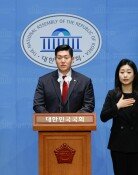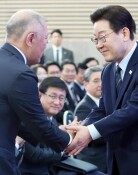Chinese president vows to be `good partner` in Korean reunification
Chinese president vows to be `good partner` in Korean reunification
Posted June. 29, 2013 05:37,
As South Korean President Park Geun-hye and her Chinese counterpart Xi Jinping had a deep discussion Thursday about the reunification of the Korean Peninsula, there is a growing possibility that the two countries will begin discussions of the issue in earnest.
The two leaders defined the future vision for the bilateral ties as substantiating the partnership for strategic cooperation and agreed to expand bilateral communication in the diplomatic and security fields by establishing a high-level dialogue system. This is interpreted as a move to establish a channel for close consultations between the two countries in the event of changes in North Korea and the two Koreas reunification.
Talking about visions for the bilateral relations over the next two decades, President Park suggested the Chinese leader that they make a new history as it is possible that our dream could come true. South Korean Foreign Minister Yun Byung-se said that the South Korean president was talking about the reunification, indicating that the leaders of the two countries discussed the possibility of a reunified Korean Peninsula within the next 20 years.
President Park also explained in detail to Xi about the nature and meaning of the reunification, noting that a unified Korea would contribute to peace and prosperity in Northeast Asia, the development of Chinas northeastern region, and prosperity in both South Korea and China. Xi responded by saying that the denuclearization and peaceful reunification are Chinese peoples two greatest hopes for the Korean Peninsula, according to the South Korean foreign minister. At a joint news conference, Xi also stressed that Beijing supports the two Koreas improving their relations, realizing reconciliation and cooperation, and ultimately achieving independent and peaceful reunification.
During a special luncheon with Xi on Friday, the South Korean president also explained in detail why the Korean Peninsulas peaceful reunification would be of help to all countries in the region, asking China to be a good partner in the denuclearization of the peninsula and inter-Korean reunification. Senior presidential secretary for foreign affairs and security Ju Chul-ki said that Xi also expressed his agreement.
The two leaders had more substantial discussions about reunification than any time in the past, South Korean officials said. "The Chinese president gave a message that Beijing would not refuse peaceful reunification led by Seoul."
Xis reaction is in line with Beijings judgment that North Koreas provocations would hurt Chinas strategic interest. A diplomatic source said, China has begun to review and debate over which would correspond to Chinas interest between the maintenance of the North Korea regime and the South Korea-led reunification of the peninsula. In February this year, former South Korean President Lee Myung-bak said in an exclusive interview with the Dong-A Ilbo, China is saying that South Korea-led peaceful reunification does not go against Chinas interest. The leaders between South Korea and China have begun to talk (about the peninsulas reunification).
However, some people remain cautious, saying that the South should not come to a rash conclusion that China would make a dramatic about-face in its North Korea policy centered on maintaining stability in the North. Some experts warned that Seoul should not fall into the "pitfall of wishful thinking.
They say so because Xis support of an independent and peaceful reunification of the peninsula reflects Beijings complicated conditions that a reunified Korea should not have U.S. troops stationed in the country and that U.S. intervention in the reunification process should be minimized.
A China specialist noted, Seoul should consistently convince Beijing that a reunified Korea would be of help to Chinas interest and address Beijings suspicion that Seoul is trying to cause the North Korean regime to collapse.







